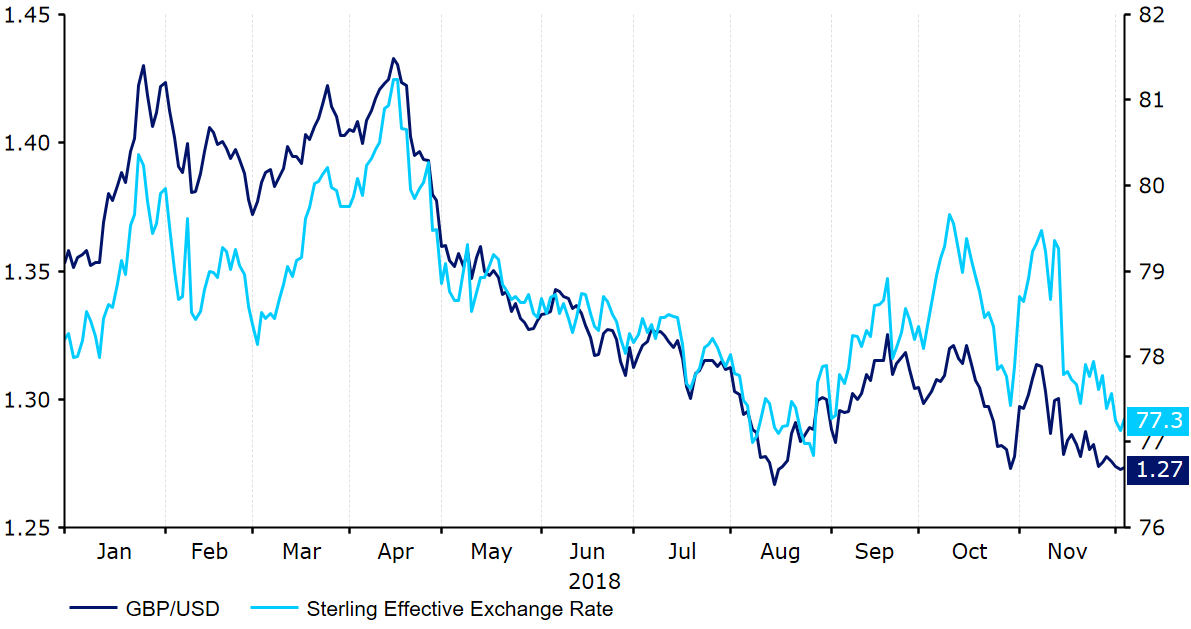How will next week’s parliamentary Brexit vote work?
- Go back to blog home
- Latest
Theresa May faces the sternest test during her time as Prime Minister on Tuesday 11th December when she takes her draft Brexit deal to a UK government vote.
Figure 1: GBP/USD (Jan ‘18 – Dec ‘18)
But how will the vote work and what repercussions could the vote have on the UK’s EU exit?
What time will the outcome of the vote be known?
MPs commenced a five-day Meaningful Vote debate period on Tuesday 2nd, which will culminate in a final debate on Tuesday 11th.
Voting on amendments to the below motion will commence at 7:00pm UK time on Tuesday. A maximum of six amendments can be made. Dependant on the number of amendments proposed then the final vote on the motion is likely to take place at around 8:00-8:30pm. The outcome of the final vote is likely to be known soon after.
What will MPs be debating?
MPs will either be voting in favour of or rejecting Theresa May’s 585-page draft Brexit withdrawal bill, i.e. they will be voting on the following statement:
That this House approves for the purposes of section 13(1)(b) of the European Union (Withdrawal) Act 2018, the negotiated withdrawal agreement laid before the House on Monday 26 November 2018 with the title ‘Agreement on the withdrawal of the United Kingdom of Great Britain and Northern Ireland from the European Union and the European Atomic Energy Community’ and the framework for the future relationship laid before the House on Monday 26 November 2018 with the title ‘Political Declaration setting out the framework for the future relationship between the European Union and the United Kingdom’.
How many MPs will be voting?
639 out of the 650 members of parliament will be casting a vote. The remaining 11 non-voting members are made up of the speaker and his three deputies and seven members of Sinn Féin.
How many approval votes are required to pass the agreement?
At least 320 out of 650. This is looking very unlikely after more than 90 Tory MPs suggested that they would not vote in favour of the PM’s deal. Labour and the DUP are almost certain to reject it. Betting odds have fallen sharply in the last few days and are now showing a mere 15% implied probability that the yes vote prevails.
What happens if MPs do not back the deal?
Following the passing of Tuesday’s so-called Grieve Amendment in parliament, Theresa May would have 21 days to return a motion on how to proceed with Brexit. This could involve the following:
- Theresa May seeks to renegotiate or perhaps ask for an extension to Article 50 (would require consent from all 27 EU members).
- Snap election called, acting as a de-facto public vote on May’s Brexit deal. Two-thirds of MPs would need to support it.
- Theresa May either resigns or is ousted by her peers. This could pave the way for 4).
- A second EU referendum (a ‘people’s vote’) is called. Betting markets are now placing as high as a 40% chance of another referendum before 2020.
The chances that the UK leaves the EU without a deal has fallen dramatically after the European Court of Justice (ECJ) issued an opinion that the UK would be able to unilaterally revoke Article 50. That being said, it cannot be entirely ruled out as a possibility.


